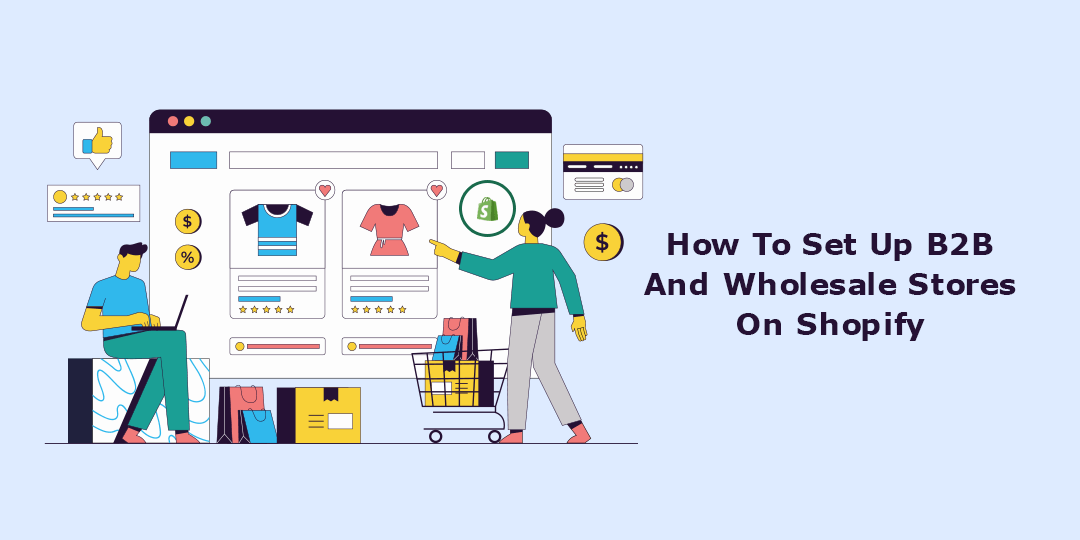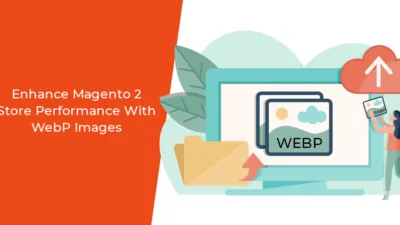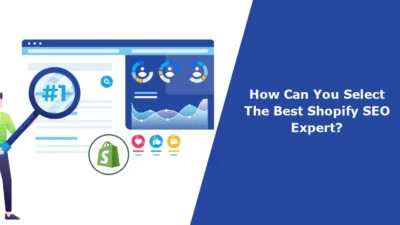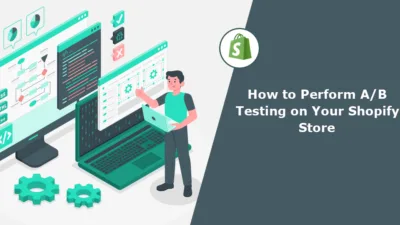With a merchant base of 1 million merchants, user-friendly tools and features to provide a seamless shopping experience to your customers, Shopify is the best eCommerce platform preferred by most eCommerce business owners. Whether you are a retailer or a wholesaler, launching your eCommerce website on Shopify is just a piece of cake for you. With these Shopify tools and features, countless B2C merchants have skyrocketed their eCommerce businesses.
You are wrong if you think that Shopify is for B2C customers only because you can easily build a B2B Shopify store with custom pricing and offering engaging discounts. This informative blog will discuss setting up a B2B and wholesale store on Shopify.
What is Shopify B2B Store?
Just like a B2C Shopify store made for selling products directly to your customers, a B2B Shopify store is a store created to sell products in bulk to another business or a wholesaler. The Shopify B2B store allows the admin to offer customized B2B pricing and discounts to wholesalers.
Before laying the foundation of a Shopify B2B store, you must understand the difference between Shopify B2B and B2C customers. B2C (business to customers) are such customers who do not make bulk purchases. They hardly purchase 5 to 6 products together if there is a discount.
On the other hand, B2B (business to business) customers who already have a business. They are either retailers or wholesalers. Unlike ordinary B2C customers, these customers have to buy products in bulk, with complicated product needs and repetitive purchases. As B2B customers have many pricing and customization needs, a Shopify B2c store will not provide the features of a business.
How Good is Shopify for B2B Stores?
As stated previously, Shopify has user-friendly features that provide customers with a seamless shopping and browsing experience. In addition to this, Shopify allows admins to customize their Shopify store and tailor it to meet business-to-business needs. Shopify allows B2B businesses to create a professional and engaging Shopify store without the need for coding knowledge.
Creating a B2B-rich Shopify store allows you to easily manage your bulk orders, customize discounting offers and personalized pricing options, and facilitate efficient interactions with wholesale clients.
Moreover, Shopify’s secure payment gateways and robust inventory management system ensure smooth transactions and inventory control. While it may lack some advanced B2B-specific features found in dedicated platforms, Shopify’s flexibility, scalability, and wide adoption make it a solid choice for many B2B businesses looking to establish a strong online presence.
How to Set Up B2B and Wholesale Shopify Store?
No matter if you are a B2B Shopify business searching for a solution for enhancing your B2B business or a B2C business that wants to attract wholesalers to your store. Shopify has multiple ways through which you can accomplish your business needs from either of the scenario mentioned above.
| Offers/Discounts | Use 3rd party apps | Upgrade to Shopify Plus | Handshake Marketplace | |
| Cost | Low Cost | $25-$100/month | $2000/month | Free to join (no commission) |
| Pros | Affordable | Wholesale-like features at affordable price | Suitable for scalability and hosting | Wider audience reaches an affordable cost |
| Cons | Lacks features and is very unprofessional | None | Very costly and limited customization options | Works for US-based businesses only and delivers no strong brand experience |
| Suitable for | Small scale businesses | All businesses | Large scale businesses | US-based small and medium scaled businesses |
1. Offering Discounts and Offers
Shopify has everything a merchant needs to run a business, and Shopify discounts are one of them. Discounting offers, sale offers, “buy 1 get 1” offers, etc., have always been affordable and effective methods for bringing in new customers. Shopify allows you to set up different discounts for your B2B and wholesale Shopify customers in the same way you set up discounting offers for B2C customers.
Unfortunately, this tactic is not the best approach for large-scale businesses and is very unprofessional. As we stated previously, wholesale customers are those who need to repeat their previous bulk purchases, and entering a discounting code every time with every repetitive purchase will be very tiresome for the wholesaler, and there are chances that the wholesaler might not purchase from your store again.
The discounting offers will undoubtedly be beneficial for individual customers or specific Shopify customer groups but not for B2B and wholesalers. Also, managing a huge customer base will be challenging for you with time, for which you can use different Shopify customer groups to handle the customers easily.
2. Use Third-party Apps
Even though Shopify has everything a business needs to run successfully, there are some features that even Shopify fails to deliver to its customers. In such cases, third-party app providers come forward and contribute their expertise by developing Shopify apps. Of all the apps listed on Shopify, 80% are third-party apps.
Handling a wholesale business can be extremely difficult as you have to add dozens of products that, too, with different variants. Adding dozens of products, adding prices to them, and entering that product prices into every wholesaler’s account can make your work hard as hell and increase the chances of making a mistake.
As a solution to problems like this, using a third-party wholesaler app can help you simplify your work to a great extent.
3. Use Shopify Plus Plan
The main target audience of Shopify Plus has always been large-scale businesses planning to upgrade their offline and traditional B2B business to modern and online B2B businesses.
Getting straight to the point, you must fix one thing in your mind Shopify Plus is definitely not a cup of tea for a new B2B startup trying to find wholesale customers and sell their products at an extravagant price of $2000/month. If you are a million-dollar business and spending $2000 every month would be like taking a spoon of water from the ocean, you can surely buy the Shopify Plus plan.
The good news for Shopify Plus members is that it already provides a wholesale website with its membership, so Shopify Plus businesses can easily integrate a wholesale store.
In addition to this, Shopify allows you to create customized payment methods and pricing to enhance the customer experience. Shopify’s solutions also make the admin work simple, easy to maintain and understand wholesale websites with customers. Shopify Plus also provides a tool called Shopify Flow to help you with your back-office work and make it easy for the team to handle the tasks.
The other three options provided by Shopify – Basic Shopify, Shopify and Advanced Shopify do not provide such wholesale features as Shopify Plus, but they still are suitable for small-scale businesses.
4. Handshake Wholesale
Handshake is Shopify’s own marketplace, launched in 2020. As the name suggests, Handshake Wholesale allows businesses to register themselves as wholesale suppliers and make a separate section of Shopify products available for retailers. Similarly, customers can easily find wholesale suppliers and wholesale goods to be supplied from this platform.
Handshake is the best platform for bridging the gap between wholesale suppliers and the retailer effectively, but unfortunately, the Shopify platform can be used by US-based wholesalers and suppliers only. Also, transactions are not fulfilled via Handshake, but Shopify commented that the feature will soon be live for the users to make their work easier.
Bonus: Hire a Shopify Development Expert
Regarding Shopify customization, no one other than an expert Shopify developer can be relied on to make your wholesale Shopify store look more attractive and user-friendly. Hiring a Shopify developer allows you to customize different login pages for regular customers and wholesalers.
Shopify experts can help you run different discounting campaigns for bulk purchases and attract both regular customers and wholesalers. Depending on the customers ‘ location, you can customize the tax and other Shopify configurations.
All in all, you can easily enhance your Shopify B2B and whole store for your customers by hiring a Shopify developer and customizing your Shopify store according to your business needs.
Final Verdict
If you want to start an online B2B business and reach a wider range of audience, Shopify is the best eCommerce platform to help you achieve this wide range of audience. Here we curated different ways to set up your B2B and wholesale Shopify store. Choosing the right way suitable to your business and business requirements is advised.
We hope this article covered all the required information. Still, if you have any queries regarding the article or want to know the cost of setting up a B2B and whole Shopify store for your business or more Shopify development services, feel free to contact us or text us on our official Facebook group.
Happy Shopifying!









